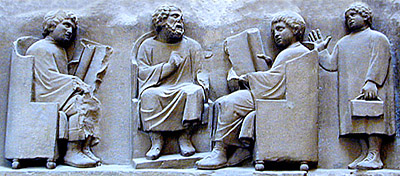 Relief of schoolteacher and pupils, end 2nd century CE |
In this poem Martial (born in Bilbilis, Spain, about 40 CE; died there c.104 CE) rants against the teacher who torments schoolboys and schoolgirls with his voice and violence. In the crowded streets of Subura the sounds of early morning shouting and blows must have carried to the rooftops. These verses are used as evidence that at least in the 1st century CE girls were given an elementary education as well as boys, and perhaps even shared the same classroom. The poem is written in elegiac couplet, which consists of two lines of poetry in dactylic meter: the first hexameter, the second pentameter (see illustration of the meter).
| 1 | Quid tibi nobiscum est, ludi scelerate magister, |
| Nondum cristati rupere silentia galli: | |
|
murmure iam saevo verberibusque tonas. |
|
| 5 | Tam grave percussis incudibus aera resultant, |
|
causidicum medio cum faber aptat equo: |
|
| mitior in magno clamor furit amphitheatro, | |
| Vicini somnum - non tota nocte - rogamus: | |
| 10 |
nam vigilare leve est, pervigilare grave est. |
| Discipulos dimitte tuos. Vis, garrule, quantum | |
Click on the underlined words for translation aids and commentary, which will appear in a small window. Close this small window after each use.